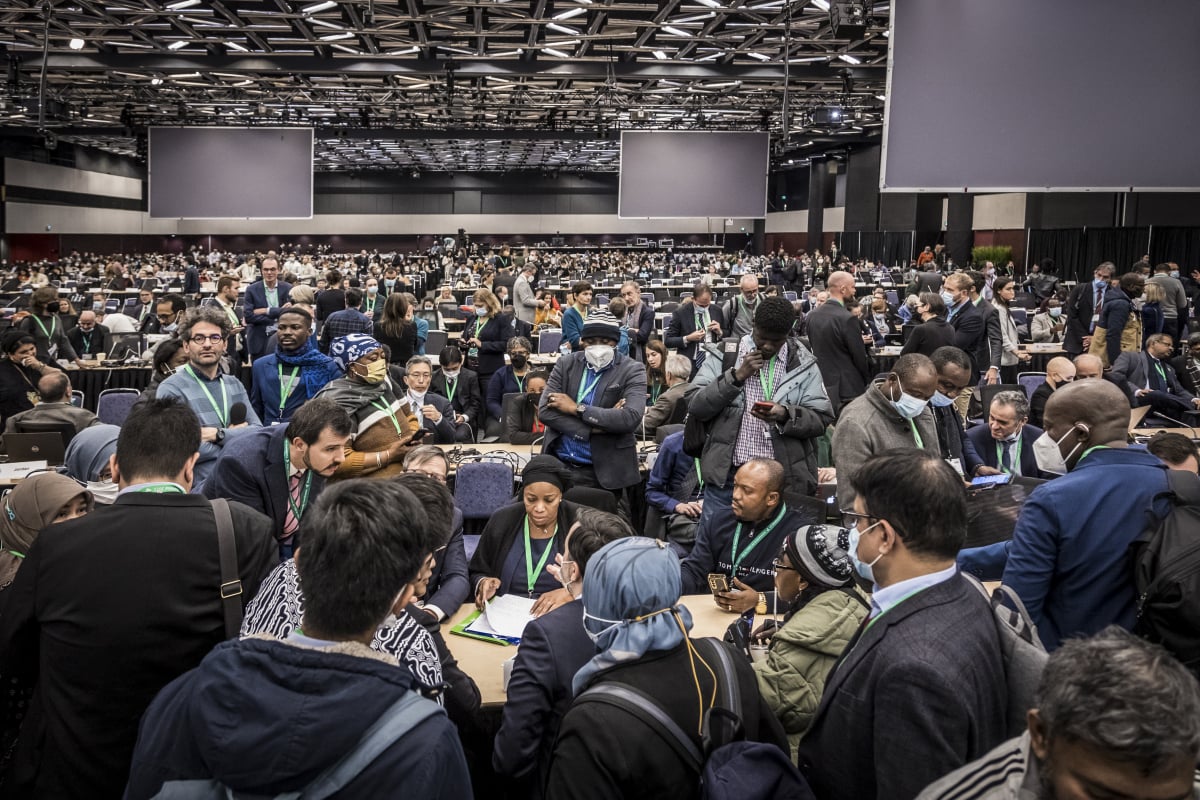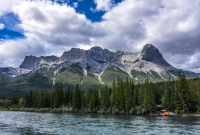Support strong Canadian climate journalism for 2025
One of the world’s leading biodiversity advocates is warning of a “combined crisis” for the planet as climate change worsens and more species go extinct. The only solution, David Cooper says, is to tackle the issues together as the world’s governments prepare for crucial upcoming international negotiations.
Cooper, the former acting executive secretary of the UN’s Secretariat of the Convention on Biological Diversity (the group tasked with organizing biodiversity negotiations) said nature loss and climate change are deeply linked, and common solutions are required.
“We see in recent years increasing incidents of fires, of floods, of droughts, of heat waves, and these are rightly attributed to climate change,” he told reporters on Wednesday. “But it's also related to biodiversity loss, and it's also related to ecosystem degradation.”
Cooper pointed to wildfires in Hawaii made more intense because of invasive species as one example of how nature and climate change are intertwined. That situation was akin to recent debates in Canada about the role of mountain pine beetles and this summer’s wildfires in Alberta (which scientists say were primarily caused by high temperatures and dry conditions), or the wildfires in 2021 that charred British Columbia so badly that when an atmospheric river hit, massive flooding occurred, contributing to disastrous landslides.
In other words, it’s all related: increasing temperatures lead to disasters that destroy habitats, and losing nature means our world is less resilient to extreme weather when it strikes.
When countries meet this October in Cali, Colombia for biodiversity negotiations, called COP16, their goal will be to slow that vicious cycle.
The previous conference (COP15) was hosted in Montreal in 2022 and saw countries agree to the Kunming-Montreal Global Biodiversity Framework – the Paris Agreement of nature protection. The pact commits countries to protect 30 per cent of land and oceans by 2030, recognizes Indigenous leadership as a central pillar of achieving these goals and reaffirms Indigenous Peoples’ right to free, prior and informed consent to development projects taking place on their territories. It also includes a call for rich countries to support poorer countries with US$200 billion to protect nature by 2030.
Environment and Climate Change Minister Steven Guilbeault said COP15 was about countries agreeing about what needed to be done, while COP16 is about how to implement the agreement.
“In the last two years we've done a lot of work, but there is still a lot of work that needs to be done,” Guilbeault said. As a planet, “species are still going extinct, we're still unsustainably using natural resources, we're not protecting critical habitats and we've still not collectively realized that in the fight against climate change, our biggest ally is nature.”
Guilbeault said a major change in how Canada tackles conservation in recent years involves partnering with Indigenous nations; “almost 100 per cent” of new conservation projects are partnerships with nations.
“In fact we're finalizing what, to our knowledge, is the world's largest Indigenous-led conservation project, in the Northwest Territories of Canada,” he said. “When finalized, and I'm confident we'll get there before COP16, it will be roughly 1 million square kilometers –– four times the size of the United Kingdom.”
Colombian Environment Minister Susana Muhamad said her goal for COP16 is nothing short of making nature protection “as relevant politically” as climate change is.
She said she doesn’t believe world governments have sufficiently appreciated the interconnectedness of nature and climate change.
“If we invest a lot in this process of nature recovery, but at the same time we are not decarbonizing, the climate will continue changing and nature will not have the time to adapt,” she said. “If nature collapses, communities and people will also collapse. Society will collapse.”
COP16 is the first of three major environment and climate negotiations scheduled for this fall. It is scheduled to run from Oct. 21 to Nov. 1.
The UN negotiations for climate change, called COP29, will be hosted in Baku, Azerbaijan from Nov. 11 to Nov. 21.
The fifth and final negotiating round for a global plastics treaty will be hosted in Busan, South Korea from Nov. 25 to Dec. 1.






Comments
Thanks for this, John.
Two primary things stood out to me.
First, the phrase, "...nature loss and climate change are deeply linked, and common solutions are required."
If solutions to climate change are not linked to biodiversity, we risk saving the biosphere-as-we-know-it from GHG emissions while simultaneously killing it with those same solutions through resulting, and continuing, biodiversity (and other) losses.
Second is your mention of the the Kunming-Montreal Global Biodiversity Framework, which document I knew existed but had not yet learned its name or specific content. (Just look at all those targets. Krikey.)
A couple of years ago, I read (somewhere) a reference to the framework (without naming it) which said (paraphrasing) that the mitigation action of protecting 30% of global land and waters also requires that the other 70% be managed in a sustainable fashion. This mention of the "other 70%" is key and rarely, if ever, mentioned (I note that even your recounting didn't mention it; see Target 1 from the agreement).
I'd encourage CNO to expand the default mentions of "30%" to habitually be rephrased as some literary form of "30+70" so that people begin to understand that the solution to the biodiversity crisis, particularly salient in the largely unpopulated Canadian context, is not presented as "31-and-done" (30-and-done doesn't roll off the tongue nearly as well).
IMO, we must start looking at the foundational beliefs and institutions of our society, and that introspection will not, I don't think, be motivated unless we recognize the importance of the missing "70%".
I'm still trying to figure Steven Guilbeault out. Does he realize how little this government has done? Does he realize his government is more a defender of the oil and gas industry than the environment? In many ways he and his predecessor are greenwash for an environmentally destructive government.
That much may be true. But name one party today that is both electable and has some kind of climate policy in place that is workable, all be it diluted.
We seem to be striving -- no, having conniption fits! -- over political solutions with a bunch of half measure, weak or hostile elected performers on the climate and biodiversity file. Is there another way forward than to put all our eggs in one basket? The evidence is mounting that renewables are starting to nip at the edges of the world economy based on fossil fuels, and it's growing fast. Consumer choice is another field within our grasp.
Journalism is suppose to both inform and inspire. I suppose I'm resisting CNO's recent tack toward describing our politician's every wart and grumble and resorting to doomerism and a narrative that's dominated by expressions of depression over hopeful reasonable solutions and adaptation measures. It may help sell subscriptions, but it sure doesn't assist someone like me to make a decision whether to take advantage of recent generous grants to go solar and convert from gas to clean electricity -- which, grants / rebates or not, will consume a huge chunk of my retirement savings and not help in any way convince my spouse to make that sacrifice.
There are a number of other sites that report on climate progress and solutions and report largely from a technical, politically neutral perspective. And many offer free subscriptions.